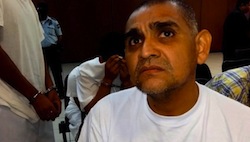An ongoing trial in El Salvador has included assertions that a gang leader was in regular contact with politicians and other government officials, even though the country’s former president recently said that the truce involved no direct contact between the two.
Evidence gathered from the cell phone of suspected gang member Rubén Antonio Rosa Lovo, who faces extortion charges along with 67 other suspected gang members, suggests that government officials were in contact with top gang leaders during the 2012-2013 gang truce, reported La Prensa Grafica.
According to prosecutors, forensic analysis of the purported gang leader’s phone suggests that Rosa Lovo was in contact with “a congressman” and “a former security minister.”
SEE ALSO: Coverage of El Salvador Gang Truce
Communications recovered from the suspected gang leader’s phone reportedly detail a conversation in which Rosa Lovo agrees to supply votes to a particular lawmaker in exchange for cooperation and support of the now-defunct gang truce.
Both David Munguía Payés and Ricardo Perdomo served as security minister for former President Mauricio Funes at different times during the era of the gang truce.
While the truce was active, major gangs like the MS13 and Barrio 18 committed to halting violence, and homicide levels fell accordingly. Funes has recently asserted that the government was not directly involved in negotiating with the gangs, and merely supported the mediators who helped brokered the truce.
InSight Crime Analysis
El Salvador’s gang truce was controversial from the very beginning. Recently, however, critics seem to be growing bolder in their attempts to impugn the actions of the previous administration, while Funes appears to be ever more eager to disown the government’s alleged role in the initiative.
The ongoing trial covered by La Prensa Grafica is not the only case in which court evidence appeared to point to contact between gang leaders and key officials. In a previous case, a protected witness reportedly testified that gang truce mediator Raul Mijango — one of those mediators that the Funes government has said it supported — approved of a gang attack on a police station.
SEE ALSO: El Salvador News and Profiles
Critics of the gang truce have argued that the initiative gave the Barrio 18 and MS13 the breathing room they needed to reorganize, consolidate, and strengthen. One concern is whether the truce allowed the gangs — in particular the MS13 — to become more sophisticated criminal structures, capable of smuggling drugs or weapons internationally.
The US Treasury Department appeared to signal that this may be the case, after announcing new sanctions against MS13 gang leaders for “orchestrating assassination campaigns against Salvadoran law enforcement, military, and government officials.” The Treasury Department first designated the MS13 as a transnational criminal organizations (TCO) in 2012.
The new sanctions from Treasury weigh in unambiguously on the side of those who believe the gang truce strengthened the MS13. Along with assertions that government officials were in closer contact with gang members than they now claim, all this ultimately makes it harder for anyone to propose working with the gangs to reduce violence and death tolls.

